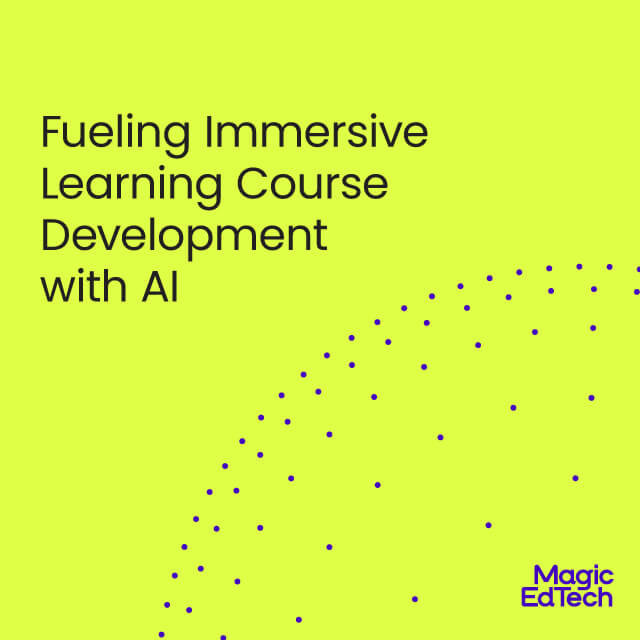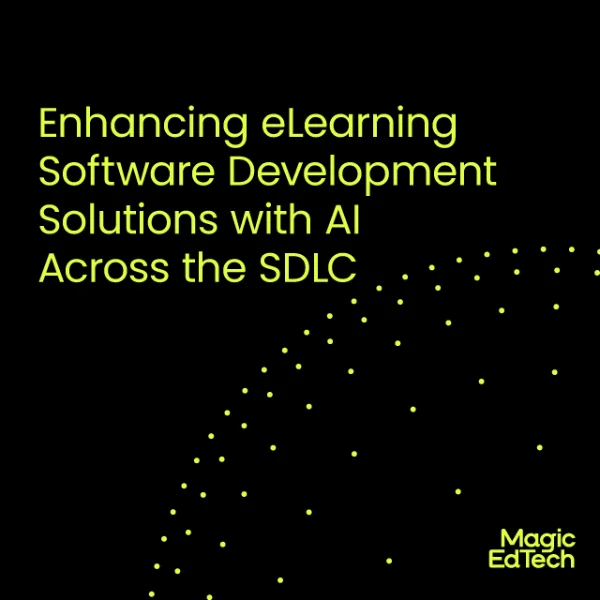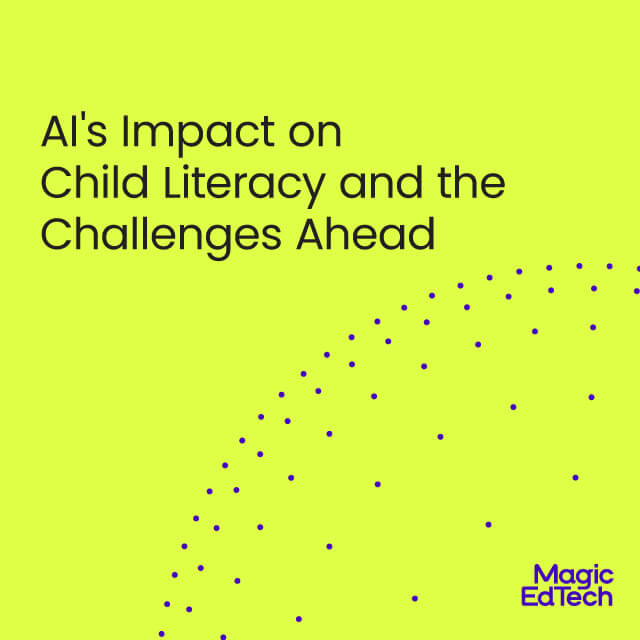How Tech and Content QA Could Thrive with a Cognitive Catalyst
- 4 August, 2023
- Reading Time: 5 mins
When we talk about content and technology, ensuring top-notch quality is crucial to the success of online learning. Content QA Managers & Directors, as well as Production Directors & VPs, hold the key to maintaining high software and platform development standards.
In this blog, we will explore the potential impact of AI-based QA in learning content and explore its role in achieving overall business success.

Impact of AI on Learning Content on a Global Scale
Since we are discussing the importance of content and tech QA, let’s look at some areas it has impacted globally.
AI Adoption in QA
According to a survey conducted by Capgemini, 78% of organizations have already implemented AI in their Quality Assurance processes, while an additional 84% are planning or considering AI integration. (Source: Capgemini World Quality Report 2021)
AI Test Automation Impact
A study by Accenture found that AI-powered test automation can reduce testing efforts by up to 85% and lead to a significant reduction in time-to-market. (Source: Accenture Technology Vision 2021)
Visual Testing Accuracy
Traditional manual visual testing typically detects only 66% of visible defects. In contrast, AI-driven visual testing tools achieve an impressive accuracy rate of 95% or higher, as reported by Applitools. (Source: Applitools Visual AI)
NLP in Content QA
An analysis by Forbes indicates that adopting Natural Language Processing (NLP) in Content QA can improve content accuracy and language quality by up to 70%. (Source: Forbes)
Multimedia Quality Control
AI-powered multimedia quality control tools have shown to be 50% more effective in identifying defects in images and videos than manual inspection, as highlighted in a report by Gartner. (Source: Gartner Hype Cycle for Artificial Intelligence 2022)
Accessibility Compliance
A case study by W3C demonstrated that AI-driven accessibility testing tools can detect up to 80% more accessibility issues in digital content, ensuring compliance with accessibility standards. (Source: W3C)
AI vs. Manual Regression Testing
A comparative study by Testlio revealed that AI-driven regression testing outperformed manual testing by detecting 30% more UI regression issues. This led to a 25% reduction in regression-related defects in the production environment. (Source: Testlio)
Cost Savings through AI
By leveraging AI in their QA processes, companies have reported cost savings of up to 30% due to increased automation and reduced error rates, according to a survey by McKinsey & Company. (Source: McKinsey & Company – AI Adoption in Businesses)
User Experience Improvement
Incorporating AI in content and tech QA resulted in a 35% improvement in user experience metrics, such as user satisfaction, retention, and conversion rates, based on data from a study by Adobe. (Source: Adobe Digital Trends Report)
Business Impact
Organizations that effectively implemented AI in their QA processes experienced a 20% increase in overall business success metrics, including revenue growth, market share, and customer loyalty, as reported in the AI Business Impact Survey. (Source: AI Business Impact Survey 2023)
These statistics demonstrate the significant impact of AI in content and technology QA, highlighting the efficiency gains, improved accuracy, and enhanced user experiences that AI-powered tools bring to the table.
As more companies embrace AI-driven QA solutions, the industry is set to witness even more significant advancements in quality assurance practices, driving business success to new heights.
How To Enhance Learning Content QA Processes with AI
Artificial Intelligence is disrupting the execution of QA practices by revolutionizing traditional approaches and offering various benefits.
Let’s explore how AI can enhance content and tech QA processes.
Content QA with AI
Intelligent business owners must recognize how AI can enhance their Quality Assurance (QA) processes. Integrating AI-powered solutions with Content QA and Tech QA workflows can help them ensure the quality of our products and services.
Here’s how it can work.
Learning Content QA with AI
- Standards Alignment: AI-powered algorithms can swiftly assess all your content against predefined standards. You can easily streamline the alignment process and ensure consistent messaging across various digital assets, reinforcing your brand identity and messaging coherence.
- Content Analysis & Accuracy: By leveraging AI-driven NLP tools, you can comprehensively analyze your content for grammatical and factual inaccuracies. This level of accuracy enhances the quality of our content and boosts your credibility and authority within the industry.
- Language & Clarity: AI-based language models are invaluable in evaluating the clarity and coherence of our content. With the right insights and suggestions, you can optimize the language to resonate better with your target audience, ultimately improving user experience and engagement.
- Multimedia Quality Control: You can incorporate AI-enabled image and video recognition systems to ensure that all multimedia elements meet your desired quality standards before they reach your audience. This minimizes the risk of visual defects or inappropriate content, safeguarding your brand’s reputation.
- Accessibility Compliance: AI algorithms help you identify potential accessibility and compliance issues. By making your digital content more accessible to everyone, you can demonstrate your commitment to providing equal opportunities and a better user experience for all.
Learning Technology QA with AI
- Test Automation Scalability: AI-powered tools offer the scalability needed to manage and expand your test automation efforts efficiently. This translates to faster testing cycles, reduced time-to-market for your products, and significant cost savings.
- Visual Testing: Your user interfaces are critical touchpoints with customers and should be flawless. AI-driven visual testing tools allow you to catch even the tiniest UI discrepancies, ensuring your products look polished and professional.
- UI Regression: AI’s assistance identifies regression issues seamlessly. You can proactively detect defects in your user interfaces, address them promptly and maintain high user satisfaction.

Why it is the Right Time to Integrate AI in Learning Content QA
Modern challenges in education require a modern approach to QA. By incorporating AI capabilities, organizations can stay ahead of the curve and remain competitive.
Let’s try to understand it with the help of two examples.
Use Case 1: AI-Powered Automated Content QA
Since manual content testing is time-consuming and prone to errors, it becomes challenging to maintain quality and consistency across diverse digital content.
AI-driven automated NLP and image recognition testing can enhance efficiency, consistency, and accuracy in content QA.
Here are some of the key benefits you get from AI-powered automated content QA:
- Efficiency: Saves time and effort for QA teams.
- Consistency: Applies standardized criteria to all content.
- Scalability: Easily handles large content volumes.
- Accuracy: Identifies subtle errors and improvements.
- Improved User Experience: Ensures top-quality content.
Use Case 2: AI-Enhanced Visual Testing for Tech QA
Experts agree that manual visual testing is limited and inefficient in identifying UI discrepancies, especially during UI regression testing.
AI-enhanced visual testing with Computer Vision precisely detects UI differences across various devices.
As a result, you get the following benefits:
- Precision: Highly accurate in detecting visual defects.
- Time Efficiency: Speeds up UI regression testing.
- Comprehensive Coverage: Ensures consistent user experiences.
- Early Detection: Catches UI defects early in development.
- Resource Optimization: Optimizes QA resources for critical tasks.
Final Thoughts
AI is crucial in transforming content and technology QA processes, paving the way for improved efficiency and excellence. By adopting AI, QA professionals can confidently navigate the challenges of the digital era and deliver exceptional products that surpass customer expectations.
So, do not resist the changes AI is bringing to education. Adopt it and leverage the technology to transform your QA practices in content and technology development. Take the next step towards a seamless integration today! Schedule a call with our experts to learn more.




